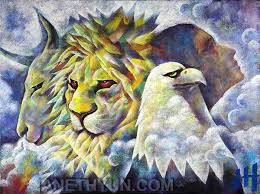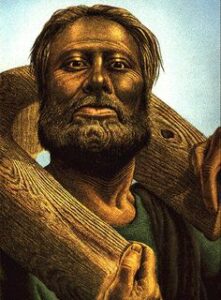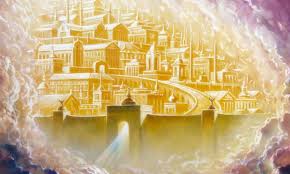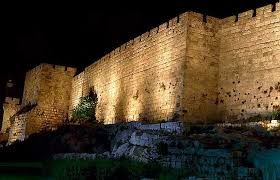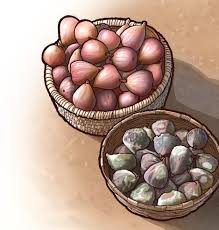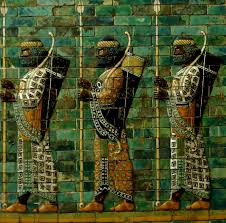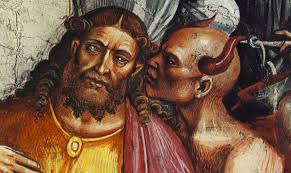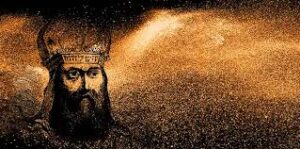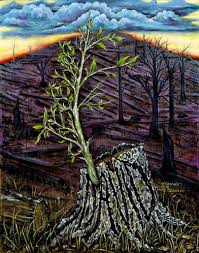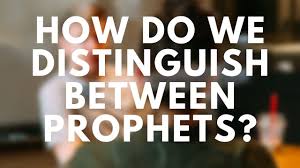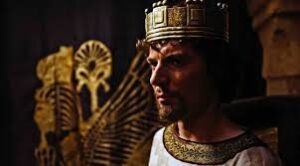Es – Ezeki’el’s Call to Be a Prophet Ezeki’el 1:28b to 3:3
Ezeki’el’s Call to Be a Prophet
Ezeki’el 1:28b to 3:3
Ezeki’el’s call to be a prophet DIG: Why do think God wanted Ezeki’el to stand on his feet rather than be face down before Him? What do you think ADONAI intends by repeatedly (93 times in the entire scroll) calling him “Son of man?” Addressed in his human weakness, where does Ezeki’el get the strength to comply with God’s request (Ezeki’el 2:2, 3:8, 12 and 14)? To whom does Ha’Shem send Ezeki’el to prophesy? What are they like? Why might Ezeki’el be afraid to take on this impossible assignment (Ezeki’el 3:6-7)? How does God console Him (Ezeki’el 2:6-7, 3:1-3, 8 and 12)?
REFLECT: As you review your life’s work, have you ever been aware of any special calling or seemingly overwhelming task ‘from the Lord? What about God stands out to you in the call to Ezeki’el?
July 31, 593 BC during the eleven-year reign of Zedekiah
Visionary experiences often accompanied the call to prophecy in Isra’el. Several prophetic books are introduced by visions (Isaiah, Obadiah, Nahum and Habakkuk), while others are presented as the words that Amos, Micah and Habakkuk saw in a vision. Ezeki’el belongs to a particular type, exemplified also in the ninth-century Micaiah ben Imlah (First Kings 22:19-23) and Isaiah of Zion (Isaiah 6), in which the designated one is sent out from the heavenly sphere as a messenger for the performance of a particular task.278
The call of Ezeki’el to be a prophet: When Ezeki’el saw the appearance of the Sh’khinah glory (to see link click Er – Ezeki’el’s First Vision), awestruck, he fell on his face and heard the voice of someone speaking from the throne above the expanse, which was above the cherubim, which was above the wheels (Ezeki’el 1:28b CJB). He said to me, “Son of man, stand up on your feet and I will speak to you” (Ezeki’el 2:1). The Hebrew expression son of man (ben-‘adam) appears 93 times in Ezeki’el. Outside of the scroll of Ezeki’el, this particular expression is only found once in Dani’el 8:17. So every time that expression is used in the TaNaKh, with that one exception, it is used in Ezeki’el.
The expression son of man emphasizes mankind in his weakness; in his frailty, in contrast to YHVH. Messiah used the titles, Son of man and Son of God. They were contrasting titles, one emphasizing His humanity and the other His deity. Yeshua’s own title for Himself in the B’rit Chadashah was the Son of man, which emphasized that He came in mortal form, capable of dying, capable of feeling pain, capable of feeling the effects of the fall (see the commentary on The Life of Christ Co – Jesus Forgives and Heals a Paralyzed Man). So both in the TaNaKh and in the New Covenant the expression son of man emphasizes man in his weakness and frailty.
However, in the TaNaKh the expression son of man, as such, never became a messianic title. In fact, only in the Jewish writings of the four hundred year intertestamental period, do we find son of man used as a messianic title. So once we get into the New Covenant writings, when Jesus uses the expression Son of man in its messianic sense, it was well established in the Judaism of His day.
The voice that spoke from the throne issued a command. As He spoke, the Ruach ha-Kodesh came into me and raised me to my feet, and I heard Ha’Shem speaking to me (Ezeki’el 2:2). Here we have an example of the ministry of the Spirit of God in the TaNaKh, where He did indwell some people. There are many things that the Ruach does in both Covenants, such as regeneration. The Ruach ha-Kodesh indwells people in both Covenants, but there is a distinction. In the B’rit Chadashah the Holy Spirit indwells all believers without exception (see the commentary on The Life of Christ Bw – What God Does For Us at the Moment of Faith), but in the TaNaKh the Ruach indwelt only some believers, those He was going to call to a specific mission. Another contrast is that New Covenant believers are indwelt forever (see the commentary on The Life of Christ Ms – The Eternal Security of the Believer), while the Holy Spirit would come and go in the righteous of the TaNaKh. So when David prayed to God: Do not cast me from Your presence or take your Holy Spirit from me (Psalm 51:11), it was a valid prayer. Therefore, the indwelling of the Ruach Ha’Kodesh was necessary for Ezeki’el to receive the prophetic office because we know for prophecy never had its origin in the human will, but prophets, though human, spoke from God as they were [inspired] by the Holy Spirit (Second Peter 1:21). Ezeki’el was then ready to receive revelation from ADONAI.
The kind of people Ezeki’el was being sent to: He said: Son of man, I am sending you to the Israelites, to the tribes of Judah and Benjamin, who formed the southern Kingdom. I am sending you to a rebellious nation that has rebelled against Me; they and their ancestors have rebelled against Me to this very day. The people to whom I am sending you are shameless and stubborn. Say to them, “This is what Adonai ELOHIM says.” As a prophet, Ezeki’el spoke the words of Adonai ELOHIM (the Sovereign LORD). He used this title of God 217 times. Elsewhere in the TaNaKh it occurs only 103 times. This name stresses both YHVH’s sovereign authority and His covenant-keeping faithfulness.
And whether they listen or fail to listen – for they are a rebellious people – they will know, in the course of time, that a prophet has been among them (Ezeki’el 2:3-5). And how will they know it? By means of fulfilled prophecy. Ezeki’el would pass the standard test of a prophet provided for in Deuteronomy 18:14-22. Now any prophet could give prophecies that were hundreds of years in the future. He won’t be around by then to be held accountable if his prophecies fail. But it is a different matter altogether if a prophecy is to be fulfilled in the next several months or years because more than likely the prophet would be around to answer if those prophecies were not fulfilled. Ezeki’el did not only give far eschatological prophecies, but he also gave near historical prophecies that would be fulfilled sooner rather than later. And once his near historical prophecies came true on a consistent basis, they would know that a prophet was among them. So while Ezeki’el was initially rejected, he was eventually accepted as a true prophet.
This is not a great way to send someone off to a ministry. Give him the word, but don’t forget . . . nobody’s going to listen to you! Don’t expect great numbers to flock to hear you. Far too many times today, people use numerical growth as the test of a successful ministry. That is a fallacy. Because that is not a promise ADONAI gave to prophets of the TaNaKh nor the apostles of the B’rit Chadashah. If we go on the basis of numerical growth as being a sign of divine favor, then we should give credit to many of the cults. We should not be against numerical growth, but we should not assume that numerical growth by itself is a sign of God’s favor. A far greater blessing is seeing those few who believe and grow in the knowledge of the LORD.
After telling Ezeki’el not to count on much success with this rebellious people, God says: And you, son of man, no matter what they say to you, do not be afraid of them or their words. The prospects were not glamorous. There would be discomfort and danger. Do not be afraid, though briers and thorns are all around you and you live among scorpions. Hardly enticing. For the third time Ha’Shem declares: Do not be afraid of what they say or be terrified by them, though they are a rebellious people. You must speak My words to them, whether they listen or fail to listen, for they are most rebellious (Ezeki’el 2:6-7). The point He was making is that they will not hear since they are most rebellious. But his witness must be borne even if the environment is totally inhospitable, in the conviction that in some way, at some time, its value will bear spiritual fruit. Is this not so for us today?
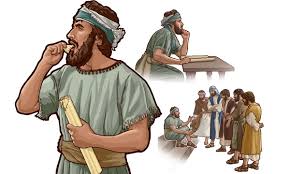
Eat this scroll: After being told not to be afraid of the rebellious people to whom he was being sent, Ezeki’el is given a warning. Listen to what YHVH has to say and not be rebellious himself. Don’t be rebellious like that rebellious people. Don’t reflect the same kind of attitude toward the word of God that the nation of Isra’el is reflecting. He was not to object to his calling as Moshe did (see the commentary on Exodus Ap – The Call of Moses), or as Jeremiah did (see Aj – The Call of Jeremiah). Instead, Ezeki’el was expected to accept his calling and follow through with it. But you, son of man, listen to what I say to you. Do not rebel like that rebellious people (Ezeki’el 2:8a).
Open your mouth and eat what I give you. Then I looked, and I saw a hand stretched out to me. In it was a scroll, which He unrolled before me. Basically, this scroll contained within it the prophecies that Ezeki’el was supposed to foretell. On both sides of it were written words of lament and mourning and woe (Ezeki’el 2:8b-10). Normally scrolls were not written on this way; the inside was written on and the outside was blank. But Ezeki’el was given a scroll that was written on both sides. Every available space on that scroll was completely full. There was no room for Ezeki’el to write his own words. And the point that is being made here, and would be made clear in Ezeki’el 3:16-27, is that Ezeki’el was to speak nothing but the words of YHVH.
One thing to remember is that the words of the prophets were not always necessarily inspired. They were inspired only when they were prophesying the true words of God. An example of this is the story of David when he was thinking about building a Temple for ADONAI. He was discussing this with Nathan the prophet. David asked Nathan what he thought of the idea, and the prophet thought it was a great idea. Go ahead and build the Temple. However, God did not inspire those words. It was his own personal opinion. But that night the word of the LORD came to Nathan. Go back to David and tell him not to build the Temple. I’ve got someone else in mind. So Ezeki’el was only to speak the words of God.
As Ezeki’el looked at the scroll, he saw its content was made up of three things: lament, mourning and woe. The prophet’s ministry was going to be about the destruction of the southern kingdom of Judah: the fall of Jerusalem, the burning of the Temple and the exile. And He said to me, “Son of man, eat what is before you, eat this scroll; then go and speak to the people of Isra’el.” The word eat is emphatic. The words of God must first be digested . . . then prophesied to the people of Isra’el. Ezeki’el was obedient. So I opened my mouth, and He gave me the scroll to eat. Then He said to me, “Son of man, eat this scroll I am giving you and fill your stomach with it. So I ate it, and it tasted as sweet as honey in my mouth (also see Jeremiah 15:16 and Revelation 10:9-11) because it contained the words of God.279



